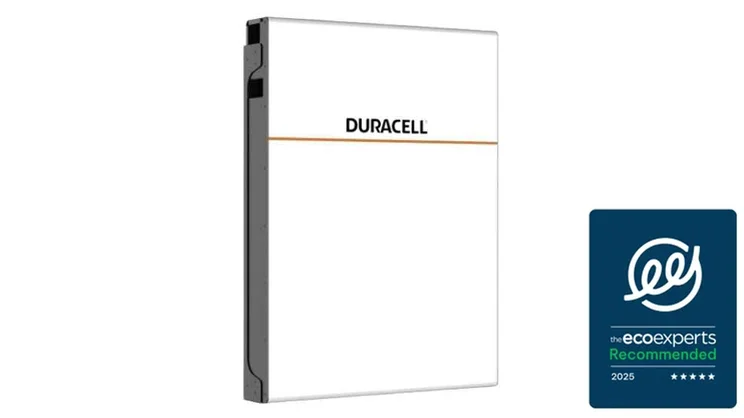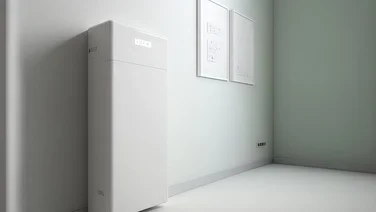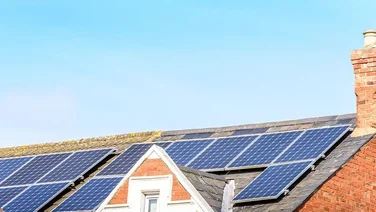We receive a small fee from trusted installers when you request a quote through our site. This helps us keep our content independent, well-researched and up to date – Learn more
- Battery Location Rules: Lofts, Garages, and Fire Safety
- How did we choose the best solar batteries?
- The best solar batteries at a glance
- Duracell Dura5 – best for smart features
- Tesla Powerwall 2 - best for usable capacity
- Alpha Smile5 ESS 10.1 - best for value for money
- Moixa Smart Battery (4.8kWh) - best for warranty
- Enphase IQ Battery 5P- best for range of features
- Huawei Luna 2000-10 - best for limited space
- Puredrive PureStorage II - best for operating temperature
- Powervault P4 (8kWh) - best for scalability
- Key solar battery criteria explained
- Next steps
- A solar storage battery lets you use electricity from your solar panels 24/7
- The best batteries include the Duracell Dura5 and the Tesla Powerwall 2
- A battery can save the average house over £500 per year
- We analysed 27 of the best storage batteries before choosing the top eight
- Key factors included value for money, capacity, warranty and lifespan

Adding a storage battery to your solar PV system lets you use free solar energy 24/7 – not just when the sun shines. This cuts your annual electricity bill by hundreds of pounds more than solar panels alone.
But while a battery can slash your bills, it’s a sizeable upfront investment. Solar storage batteries cost from around £2,500 to well over £5,000.
To help you spend your money wisely, our team of researchers analysed 27 market-leading batteries and compared them on key factors such as capacity, warranty and value for money. Find our top eight below.
READ NEXT: The best solar panels for UK homes
Which solar products are you interested in?
Get startedBattery Location Rules: Lofts, Garages, and Fire Safety
Recent UK safety changes mean some major companies (like Octopus) will no longer install batteries in lofts or attached garages due to fire exit regulations. While LiFePO4 cells are extremely stable, current best practice is an unattached garage or an external Glass Reinforced Plastic (GRP) enclosure with proper ventilation to maintain efficiency during winter.
How did we choose the best solar batteries?
Our team of researchers spent 28 hours analysing seven factors in 27 of the best batteries currently available.
After looking at each battery’s specifications, pros and cons, we picked out the best overall. We gave each one a rating out of five for these key criteria:
- Value for money
- Usable capacity
- Depth of Discharge (DoD)
- Temperature resistance
- Compact size
- Warranty
- Lifespan
- Scalability
You can see our chosen batteries at a glance below. Then we’ll go into more detail about each one.
Take a look at our complete guide to solar batteries to arm yourself with all the information you need when discussing battery choices and quotes.
The best solar batteries at a glance
Here are the key specs of our top batteries:
| Solar battery model | Typical price | Capacity | Best for |
|---|---|---|---|
| Duracell Dura5 | From £4,000 including installation | 5kWh | Smart features |
| Tesla Powerwall 2 | £5,800-£8,000 | 13.5kWh | Usable capacity |
| Alpha Smile5 ESS 10.1 | £3,958 | 10,000 cycles (full charge to empty = one cycle) | Value for money |
| Moixa Smart Battery | £4,450 | 4.8kWh | Warranty |
| Enphase IQ Battery 5P | £2,000 – £3,500 | 5kWh | Range of features |
| Huawei Luna 2000-10 | £5,210.45 | 5kWh-30kWh | Limited space |
| Puredrive PureStorage II | £2,400-£5,500 | 10kWh | Operating temperature |
| Powervault P4 | £4,700-£14,000 | 8kWh-24kWh | Scalability |
FAQ: Tesla vs. Sigenstor: Which offers better value per kWh in 2026?
The Tesla Powerwall 3 is often viewed as the premium choice, and actually provides superior value in pure energy terms at ~0.0015 kWh/£ compared to Sigenstor’s ~0.0011 kWh/£. Sigenergy offers modularity that is easier for future expansion, but Tesla’s integrated 13.5kWh capacity and robust software make it highly competitive for medium and large households.
Duracell Dura5 – best for smart features

A solar-plus-battery system can slash your energy bills. You’ll get the biggest saving if your battery automatically knows when to store and use solar energy, how much to store, and when to utilise off-peak electricity instead.
Duracell’s Dura5 battery is brilliant at doing this. Its superb companion app uses an algorithm to analyse weather forecasts, then ensures your battery is fully charged in preparation for less sunny periods.
The Dura5, designed and built in collaboration with solar battery brand Puredrive, also has top notch charge and discharge speeds. It can reach full capacity in just one hour of charging, so it’s always ready with stored electricity when you need it.
At 5kW the Dura5’s capacity is small compared with some on our list, but it’s enough to cover the daily electricity needs of the average UK household. If your needs grow, you can add more units to create a bigger storage system – up to a staggering 32 (160kW) maximum.
The battery’s small capacity also keeps its price down. Units cost from £1,600 off the shelf, or around £4,000 including professional installation.
- Among the best smart optimisation features and app we've seen
- Up to 32 5kW units can be stacked together
- Compact, modern design
- Good value, costing from £4,000 including installation
- Duracell Energy has an outstanding 4.8 Trustpilot rating for customer support
- 5kW may not be enough for your home
Tesla Powerwall 2 – best for usable capacity

Tesla is best known for its electric cars, so it’s no surprise to learn that its electricity storage batteries are excellent too. Its Powerwall 2 is the perfect example, achieving the rare feat of a 100% usable capacity.
That means you can use all 13.5 kilowatt hours (kWh) of the Powerwall 2’s available power, which in situations where you need to use the entire battery’s charge, can be extremely useful.
The majority of solar batteries have usable capacities lower than their actual capacity, so you can only use say, 90% of a battery’s available power.
Powerwall 2 is whisper quiet too – and with sleek aesthetics, it looks every part of the futuristic tech we’ve come to expect from Tesla.
If you need extra power, you can stack multiple Powerwalls together, but with a healthy capacity of 13.5 kWh, most homes should function just fine with a single unit.
Tesla also supplies solar panels, making it easier for homeowners to buy a solar-plus-storage system in one place.
- High capacity
- 100% usable capacity
- Quiet when in operation
- Aesthetic, modern appearance
- Expensive
- Smart features cost extra
Alpha Smile5 ESS 10.1 – best for value for money

Solar batteries are rarely cheap, but the Smile5 ESS 10.1 from Alpha offers relatively good value for money. It costs £3,958, which is lower than the typical solar battery price of £4,500, and it has an impressive usable capacity of 9.1 kWh.
That puts the Smile5 ESS 10.1 up there with some of the best mid-to-high range batteries on the market, but without the price hike. For context, the Encharge 10T has a 10 kWh usable capacity, and costs a comparatively eye-watering £8,374.
The lower price tag doesn’t come at the cost of durability either, as the Smile5 ESS 10.1 boasts 10,000 cycles (going from a full charge to empty = one cycle). That’ll mean your battery comfortably lasts well over a decade without much impact to its efficiency.
- Good value for money
- High capacity
- Long lifespan
- 10 year warranty requires internet connection
- Warranty could be nullified if internet cuts out
- Short warranty for the inverter
Moixa Smart Battery (4.8kWh) – best for warranty

Almost all solar batteries come with a 10-year warranty, and the Moixa Smart Battery is no different. What separates it from the pack is the Gridshare initiative, which will give you an unlimited warranty if you join.
Gridshare helps Moixa customers trade excess power stored in its Smart Batteries to the grid. If you join the Gridshare Cashback Scheme, you’ll also get £50 a year for the first three years.
After this, you’ll be entitled to a share in the profits of your electricity exported to the grid, with Moixa paying you 50% for the electricity your Smart Battery generates.
Even though the profits aren’t that high, and you could probably make more with the Smart Export Guarantee, the unlimited warranty is a big bonus.
- Unlimited warranty
- Cashback scheme
- Not very expensive compared to other batteries
- Only has 85% usable capacity
- Low capacity
- Heavy
Enphase IQ Battery 5P- best for range of features

The Enphase IQ Battery 5P has one of the smaller capacities in our line-up, but its unbeatable 100% DoD means you can make use of all 5kWh. The unit can also be “stacked” with up to three more units to create a capacity of 10kWh, 15kWh or 20kWh, so you can gradually expand your storage as needed.
Enphase is well known for its solar inverters, so it’s no surprise to find that the IQ Battery 5P has its own microinverters built in. This allows it to convert any AC power to DC for storing in the battery cells, and back to AC to use in your home.
That means you can use the 5P battery to store electricity from any source, not just solar panels. For example you could charge it from the grid at off-peak times, then use the stored energy at more expensive peak times.
Enphase batteries come with an outstanding app that lets you track data such as the amount of electricity you’re using and from which source. Some Enphase functions, such as the “smart switch” feature which automatically chooses your energy source, are not currently available in the UK.
The 5P’s 6,000-cycle lifespan is pretty average, but its 15-year warranty is outstanding. Clearly, Enphase is confident that its battery will perform reliably for many years.
Want to know how solar batteries are installed? Go to our step by step guide.
- 15-year warranty is among the best you'll find for a storage battery
- 100% DoD means you can use all your stored electricity
- Can be used with or without solar panels
- Comes with a good app that helps you tracks your energy usage
- 5kWh is a fairly low capacity, but you can stack up to four units together for 20kWh of storage
- Advanced features such as smart switch are not yet available in the UK
Huawei Luna 2000-10 – best for limited space

Solar batteries can be bulky, make no mistake, but if space is an issue then the Huawei Luna 2000-10 is a smart choice.
The unit is just 150 mm deep, meaning you can easily install it in a garage with limited space, or even in an under-stair cupboard — and still have room to spare. The Luna 2000-10 is waterproof too, so you can discreetly install it outside, if you prefer.
The battery can be mounted on the wall or installed standing, giving you flexibility for where you want to place it.
We’ve covered the 2000-10 model here, but really, the Luna 2000 is a stackable battery module that comes in 5 kW units — the 2000-10 is the middle-ground option of 10 kW.
You can increase the capacity of a single Luna 2000 tower up to 15 kWh, or connect two complete towers to reach 30 kWh.
- Compact design
- Stackable battery module that allows you to increase or decrease capacity
- High usable capacity
- Can only be used with Huawei inverters
- Shorter lifespan than other batteries of equal cost
Puredrive PureStorage II – best for operating temperature

Solar batteries start to work less effectively once they either exceed or fall below certain temperatures, with some models struggling to work efficiently above 30°C.
That’s a temperature the UK has already seen far too often in recent years, as the damaging effects of climate change become more common. And some parts of the home, such as the garage (a popular place to install solar batteries), often become even hotter than the outside world.
PureStorage from Puredrive is the solar battery to go for if you want to future-proof your home storage against significant temperature fluctuations. It can operate efficiently between -20°C and 60°C.
These are temperatures that’ll realistically never be hit in the UK, but it doesn’t hurt to have a guarantee.
- Can operate at very high and very low temperatures
- Not very expensive compared to other batteries
- High capacity for a low price
- Takes up a lot of space
- On the heavier side
Powervault P4 (8kWh) – best for scalability

Want effortless control over your battery system’s capacity? Get a battery that’s easily scalable up to a large capacity. With the Powervault P4 you can easily install new battery modules, enabling it to store from 8 kWh all the way up to 24 kWh.
With this level of flexibility, you can confidently purchase a futureproof system whilst minimising the risk of oversizing. This is a common challenge that impacts the ROI of solar battery systems.
The Powervault P4 is also a very smart system. The “smartSTOR” system chooses whether to use off-peak grid energy or free renewable energy, based on weather forecasts and your live tariff data. This clever technology allows you to save even more money on your energy bills.
- Scalable battery capacity
- Potential for very high capacity
- 100% usable capacity
- High cost
- Heavy
FAQ: Is GivEnergy still a ‘safe’ brand given recent support concerns?
Historically a UK favorite, GivEnergy has faced significant Reddit criticism in 2025/2026 regarding “appalling” customer support response times and high staff turnover. While the hardware remains popular, many experts now recommend Fox ESS or Sigenergy for those prioritizing reliable, long-term, UK-based support and better warranty stability.
Key solar battery criteria explained
Our researchers spent 28 hours investigating the solar battery market. First we narrowed the huge field down to the top 27 models currently available, and then after further analysis we determined the best of the bunch.
Here are the key factors that helped us narrow down our selection:
- Value for money – Getting a solar battery isn’t cheap, with even the smallest units costing more than £1,500. But you can still find some great options that’ll help you break even in just a few years.
- Usable capability – How much energy do you need every day? Bear in mind that the headline capacity of a battery isn’t usually its usable capacity, which tends to be around 90% of the headline figure.
- Depth of discharge – This dictates how much of the battery’s capacity should be used before recharging it. Most modern lithium-ion batteries come with a DoD of 90% or more.
- Temperature resistance – You don’t want to find yourself in either a cold snap or a heatwave and have a battery that stops working. Some batteries can work well in extremes of -20°C and 60°C.
- Compact size – Some manufacturers are better at condensing power into smaller units than others, but this can increase the total cost. Beware of the 3.68kW inverter trap, where many installers limit systems to a 3.68kW inverter to avoid a complex DNO (G99) application. If you have a large battery, this limit means you cannot discharge fast enough to power heavy appliances like an oven and dishwasher simultaneously, forcing you to pull expensive peak-rate power from the grid anyway. Ensure your installer applies for a higher limit (G99) if your home usage exceeds 4kW during peak times.
- Warranty – Most storage batteries come with a 10-year product warranty, but the very best models exceed that.
- Lifespan – Another good sign of durability is a battery’s guaranteed number of ‘cycles’ (full discharge and recharge), usually 4,000 or more.
- Scalability – The best batteries come as modular units that you can stack to increase (“scale”) their capacity as your needs increase over time.
- Smart features – Look for monitoring apps that let you track metrics such as remaining charge, charging source and excess electricity that’s being exported to the grid. The best batteries also have automatic power cut backup, so they’ll immediately start powering your home when the grid cuts out.
Next steps
The solar battery market is constantly expanding, and more companies are looking to cash in on the increased demand.
With a solar battery and a solar panel system, you’ll typically save £669 on your energy bills. The upfront cost is high, however, putting the technology out of reach of thousands of UK households who would benefit.
If you’re ready to compare prices for solar-plus-storage, we can help. Enter a few details about your home in the form and we’ll put you in touch with our expert installers. They’ll get back to you with bespoke quotes for you to compare.
Which solar products are you interested in?
Get started








